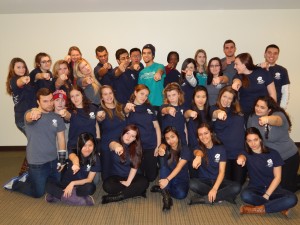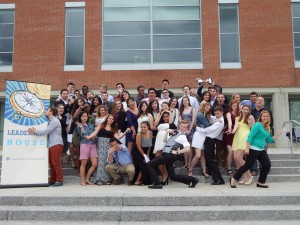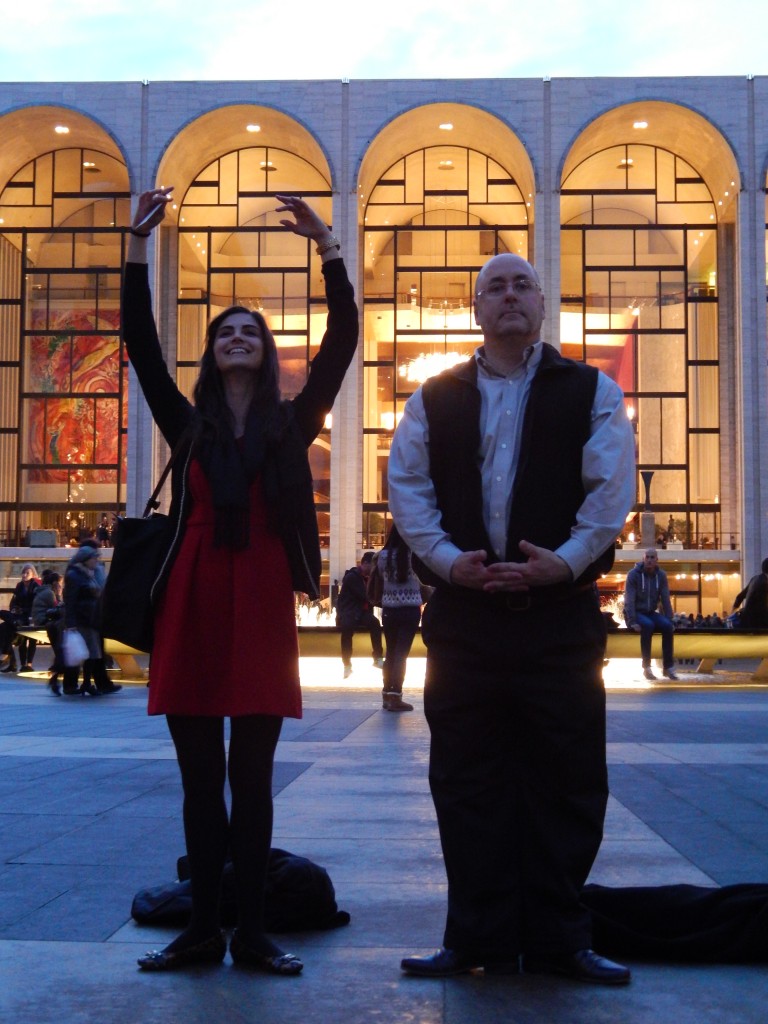A guest post by Nicole Lorenzo, Class of 2015; Co-Chair, H.O.L.D.U.P!

The majority of society seems to believe that the pair, “introverted” and “leader” do not quite go together as well as “extroverted” and “leader.” The former is more of a peanut butter and Fluff sandwich, rather than a peanut butter and jelly sandwich. Although less common, peanut butter and Fluff sandwiches challenge the “norm” of school lunches among a sea of jelly-stained brown bags.
Commonly, an image of the quintessential leader includes someone who thrives in a crowd, exhibiting an air of entertainment and confidence. It is someone who is gregarious, charismatic, bold, and extroverted. In society, there seems to be a common misconception that great leaders have extroverted personalities. However, several studies from the book Quiet: The Power of Introverts in a World That Can’t Stop Talking estimate that a full 40 percent of executives are introverts. Evidently, there is a large amount of leadership coming from individuals who society labels quiet, shy, withdrawn, diffident, or even antisocial. Consider the leaders Mohandas Ghandi and Mother Theresa, two of the greatest influencers of the century. They are historical examples of introverts that surpassed the boundaries surrounding what a “traditional” leader is pictured to be. Although introverts are usually the minority personality type, real-time statistics are difficult to evaluate because people are either unaware of their personality type, or they are ambiverts, falling in the middle of the introversion-extroversion Spectrum.
So, what makes an introvert? Introversion is one end of the personality continuum of introversion-extroversion. While extroverts are considered outgoing and gather energy from high-stimulation environments, introverts are more introspective and gather energy in low-stimulation environments. Learning from my time as a leader, I thrive in one-on-one situations, pairs, or small groups. For example, after H.O.L.D.U.P’s Fall Kick-Off, which lasts about 6 hours and includes about 30 people in one room, all I wanted to do was be alone. I just wanted peace and quiet for an hour so I could “recharge.” This is one way to gauge whether or not you tend to be more introverted or extroverted. We all have a little bit of introversion and extroversion within us. It’s important to remember introversion and extroversion lie on a continuum and are not mutually exclusive.
At first, introversion might seem like an inhibiting characteristic in a leader, but it has its advantages. I certainly don’t consider myself the one who commands a room’s attention with an entertaining tale from last night or a booming shout. But, I possess something equally as valuable as an extrovert; I use the introvert’s innate ability to captivate attention with an intentional presence, and deliberately crafted message. From freshman to senior year, I grew as a leader and learned how to confidently express my ideas to the group as a whole, no matter how novel. It was these unprecedented ideas that helped the organization consider things that they had not considered before, and it is this precise thinking style that helps progress into the future.
One challenge for me as an introvert in a predominantly extroverted world is delegating. Since I am introverted, I like to be on my own, and therefore have become quite competent at tasks without help. When I was 4, I would order my own food at restaurants and would ask my parents, with a confused look, why the older boy in the booth nearby had his parents order for him. When I was 5 years old, I remember visiting my grandmother. She always wanted to make me breakfast, help me get dressed, brush my hair, and do everything for me. But, I told her I wanted to do it myself and didn’t want help. I loved to do things on my own. To this day, I don’t like to ask for help. Yet, through my time as co-chair, I had a lot to manage and I learned how to delegate tasks to others and why it is so important for the organization on a long-term basis. After all, I won’t be co-chair forever!
In fall 2011, I applied to H.O.L.D.U.P, a completely student-run leadership organization at the University of Connecticut. I knew I had potential to be a leader, but I did not know how to reach it. The application asked, “What is the most important quality in a leader?” As a freshman and self-aware introvert, I answered that a great leader needs to know how to listen. I was told after I was accepted, that nobody else wrote about listening as the most important quality in a leader. That attribute allowed my application to stand out from the pool of responses. Through active listening, a great leader gains understanding and a basis for change. Listening to the feedback of others is the driving force in decision-making. Just like we cannot read minds, we cannot expect to know what an organization needs and wants unless we survey the internal and external parties involved.
Although I stand by my answer on that application today, I recently discovered another leadership quality that is important and seems more prevalent in introverts: humility. Being a humble leader allows you to put the focus on the individuals you lead. I noticed right away after being elected as co-chair, that I’m not interested in the limelight of leadership. I’m more interested in empowering others by being a humble leader. You won’t find me boasting about my accomplishments, but you will find me congratulating others on their accomplishments, and urging them that they can succeed past failures with grace and optimism.
After spending the beginning semesters without a leadership position, I realized I needed to do more in order to push myself to become the leader I envisioned freshman year. When the opportunity arose to start a new committee, I jumped at it and continued for a few semesters. Shortly after, I earned a spot as one of the co-chairs, and was elected to work with none other than an extroverted leader. Working with an extroverted leader was a surprisingly great experience. I’d rather connect with someone one-on-one than in a big group, because that builds a stronger more meaningful connection and network. Working closely with another leader helped me establish that connection, and helped me to be able to reach my full potential as an individual leader and a co-leader. The connections I have with each member in HOLDUP are unique, and I will cherish every relationship, however short-lived it may be. It is important for me as a leader to provide support to anyone in the organization, because I strive to be a receptive leader whom they can rely on.
After holding my last meeting as a H.O.L.D.U.P co-chair, one of the members thanked me for showing her that a leader does not have to be the loudest person in the room. Her comment inspired me to write this blog post about introverted leadership, and my journey. I hope you have a newfound understanding of what introverted leadership may look like. As you morph your view of a “traditional” leader, change up your lunch and try a peanut butter and Fluff next time.
For inquiries or comments, feel free to contact Nicole_lorenzo@att.net.


 . I am also a junior majoring in communication from Guangzhou China, that’s why I always tell people, like a lot of things in this world, I am a hundred percent made in China. Choosing to live in a Learning Community is the best decision I have ever made in my life besides getting a Netflix Account. My Learning Community Americanized me and helped me transition into my college life ever since my first day at the University of Connecticut.
. I am also a junior majoring in communication from Guangzhou China, that’s why I always tell people, like a lot of things in this world, I am a hundred percent made in China. Choosing to live in a Learning Community is the best decision I have ever made in my life besides getting a Netflix Account. My Learning Community Americanized me and helped me transition into my college life ever since my first day at the University of Connecticut.

 With Halloween around the corner, I thought it would be a good opportunity to explore our dark sides. Leaders must be fully aware of themselves, including those parts which are buried or hidden. These unseen parts of ourselves are referred to in Jungian psychology as our shadows. Often, leaders fail to find inspiration or inspire others because their shadows get in their way.
With Halloween around the corner, I thought it would be a good opportunity to explore our dark sides. Leaders must be fully aware of themselves, including those parts which are buried or hidden. These unseen parts of ourselves are referred to in Jungian psychology as our shadows. Often, leaders fail to find inspiration or inspire others because their shadows get in their way.